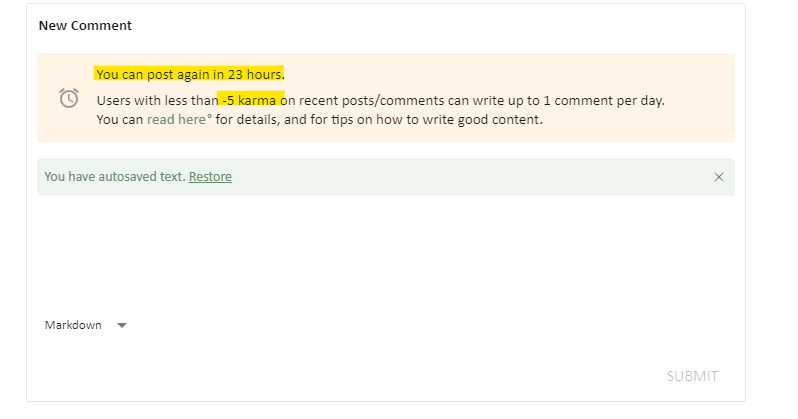Just a short post to highlight an issue with debate on LW; I have recently been involved with some interest in the debate on covid-19 origins on here. User viking_math posted a response which I was keen to respond to, but it is not possible for me to respond to that debate (or any) because the LW site has rate-limited me to one comment per 24 hours because my recent comments are on -5 karma or less.
So, I feel that I should highlight that one side of the debate (my side) is simply not going to be here. I can't prosecute a debate like this.
This is funnily enough an example of brute-force manufactured consensus - there will be a debate, people will make points on their side and the side I am arguing for will be missing, so observers will conclude that there are no valid counterarguments rather than that there are, but they were censored.
I think this is actually quite a good model of how the world has reached the wrong conclusion about various things (which may include covid-19 origins, assuming that covid-19 was actually a lab leak which is not certain). This is perhaps even more interesting than whether covid-19 came from a lab or not - we already knew before 2019 that bioerror was a serious risk. But I feel that we underestimate just how powerful multiple synergistic brute-force consensus mechanisms are at generating an information cascade into the incorrect conclusion.
I'm sure these automated systems were constructed with good intentions, but they do constitute a type of information cascade mechanism - people choose to downvote, so you cannot reply, so it looks like you have no arguments, so people choose to downvote more, etc.

I don't think this is a good characterization of my posts on this website.
If by "meta-level articles", you mean my philosophy of language work (like "Where to Draw the Boundaries?" and "Unnatural Categories Are Optimized for Deception"), I don't think success is a problem. I think that was genuinely good work that bears directly on the site's mission, independently of the historical fact that I had my own idiosyncratic ("object-level"?) reasons for getting obsessed with the philosophy of language in 2019–2020.[1]
If by "object-level articles", you mean my writing on my special-interest blog about sexology and gender, well, the overwhelming majority of that never got a karma score because it was never cross-posted to Less Wrong. (I only cross-post specific articles from my special-interest blog when I think they're plausibly relevant to the site's mission.)
If by "meta-level articles", you mean my recent memoir sequence which talks about sexology and the philosophy of language and various autobiographical episodes of low-stakes infighting among community members in Berkeley, California, well, those haven't been karma-successful: parts 1, 2, and 3 are currently[2] sitting at 0.35, 0.08 (!), and 0.54 karma-per-vote, respectively.
If by "meta-level articles", you mean posts that reply to other users of this website (such as "Contra Yudkowsky on Epistemic Conduct for Author Criticism" or "'Rationalist Discourse' Is Like 'Physicist Motors'"), I contest the "meta level" characterization. I think it's normal and not particularly meta for intellectuals to write critiques of each other's work, where Smith writes "Kittens are Cute", and Jones replies in "Contra Smith on Kitten Cuteness". Sure, it would be possible for Jones to write a broadly similar article, "Kittens Aren't Cute", that ignores Smith altogether, but I think that's often a worse choice, if the narrow purpose of Jones's article is to critique the specific arguments made by Smith, notwithstanding that someone else might have better arguments in favor of the Cute Kitten theory that have not been heretofore considered.
You're correct to notice that a lot of my recent work has a cult-infighting drama angle to it. (This is very explicit in the memoir sequence, but it noticeably leaks into my writing elsewhere.) I'm pretty sure I'm not doing it for the karma. I think I'm doing it because I'm disillusioned and traumatized from the events described in the memoir, and will hopefully get over it after I've got it all written down and out of my system.
There's another couple posts in that sequence (including this coming Saturday, probably). If you don't like it, I hereby encourage you to strong-downvote it. I write because I selfishly have something to say; I don't think I'm entitled to anyone's approval.
In some of those posts, I referenced the work of conventional academics like Brian Skyrms and others, which I think provides some support for the notion that the nature of language and categories is a philosophically rich topic that someone might find significant in its own right, rather than being some sort of smokescreen for a hidden agenda. ↩︎
Pt. 1 actually had a much higher score (over 100 points) shortly after publication, but got a lot of downvotes later after being criticized on Twitter. ↩︎